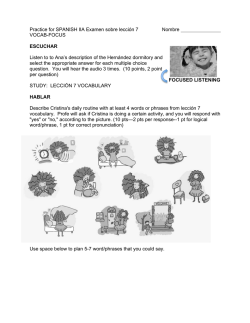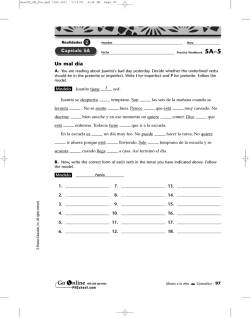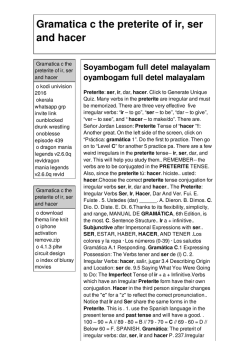
Recycle
RE3_08NLTE_Ch01_016-027.qxd 6/15/06 11:11 AM Page 16 Recycle Vocabulario Standards: 1.1, 1.2 VOCABULARY Vocabulario Core Instruction Resources: Voc. and Gram. Transparency 32 Lugares el campo el lago el mar las montañas el parque la playa el río tivid ad Ac Suggestions: Show the blank organizer and have students copy it on a sheet of paper. With the book closed, students work in groups of two and list as many words as they can remember in each category. El tiempo llueve (llover) nieva (nevar) hace . . . buen tiempo calor frío mal tiempo Standards: 1.1, 1.3 1 Focus: Practicing review vocabulary Actividades dar una caminata ir de pesca ir de vacaciones ir de viaje montar en bicicleta montar a caballo tomar el sol Extension: Have students take notes on what their partner says and later use the notes to write a paragraph with complete sentences. Answers will vary. Otras actividades hacer . . . esquí acuático moto acuática surf de vela una fogata una parrillada un picnic 1 Escribir/Hablar Práctica de vocabulario 1 Escoge dos lugares de la lista adonde a veces vas de vacaciones. Escribe dos actividades que haces allí, el tiempo que hace y los animales que puedes encontrar. Block Schedule 16 2 Ahora trabaja con otro(a) estudiante para hablar de sus vacaciones. Usen palabras de las listas. • Y tú, ¿adónde vas de vacaciones generalmente? Voy a . . . • ¿Qué actividades te gusta hacer allí? Me gusta . . . ••• •• • • • • • • • • • • • Have students break into groups of four. Taking turns, each student has to stand up and pantomine a vocabulary word from the word web. The other students in the group have to guess the word. Alternate students acting out words until all the words have been used or you call time. Animales / Insectos las hormigas el mono los mosquitos el oso el pájaro los peces tivid ad Common Errors: Following English logic, some students may talk about weather conditions attempting to use estar + adjective when hacer + noun would more commonly be used in Spanish. Provide repeated models of the hacer construction. Ac Suggestions: Remind students to use the word web as a source for ideas. Encourage them to use vocabulary and expressions that they might know which are not on the list. • ¿Qué tiempo hace? Hace . . . 16 dieciséis A ver si recuerdas . . . Heritage Language Learners Advanced Learners Assign students one or more of the following from the Actividades list: dar un(a), ir de, montar en/a, or tomar. Ask them to think of as many expressions as they can that begin with their assigned word(s), such as dar una vuelta, ir de compras, montar en bicicleta, or tomar precauciones. Have students apply the same expressions to other situations: ¿Adónde vas los fines de semana? RE3_08NLTE_Ch01_016-027.qxd 6/15/06 11:12 AM Page 17 Recycle El pretérito de los verbos You use the preterite to talk about things that happened in the past. Here are the regular preterite forms of verbs ending in -ar, -er, and -ir: caminar comer GRAMMAR Core Instruction vivir caminé caminamos comí comimos viví vivimos caminaste caminasteis comiste comisteis viviste vivisteis caminó caminaron comió comieron vivió vivieron Resources: Voc. and Gram. Transparency 33 Suggestions: Allow students a few minutes to read through the grammar review on their own. Continue by using verbal cues to elicit preterite forms of regular verbs such as ayer, anoche, la semana pasada, or el año pasado. Here are the preterite forms of the irregular verbs hacer, dar, and ver: hacer dar di hicimos dimos vi vimos hicisteis diste disteis viste visteis hizo hicieron dio dieron vio vieron Ac 2 Leer/Escribir 3 Carmen describe lo que hizo su familia durante el fin de semana. Completa las siguientes frases con la forma correcta del pretérito de los verbos. Haz una lista de ocho actividades que tú y otras personas hicieron durante las vacaciones pasadas. 1. (Yo) dar ver a mis abuelos. 2. Mis hermanos 3. Tú correr aprender muchas películas. Answers: 1. 2. 3. 4. caminatas. Ac 5. Mi padre 8. Mi hermana Modelo Caminé por la playa. Mi familia y yo hicimos un picnic en el campo. por la playa. helados. visité pasearon viste aprendimos tivid ad a montar a caballo. 7. Tú y yo Common Errors: Students commonly confuse first- and third-person preterite endings. Provide them with this mnemonic device: The first-person endings are -e as in the English first-person “me” and -i as in English first-person “I.” Con otro(a) estudiante hablen de sus vacaciones. Comparen las actividades que hicieron. en bote. 4. Nosotros 6. Mis primos Focus: Practicing regular preterite verb forms Escribir/Hablar Práctica de gramática visitar comer ANSWERS Suggestions: After students complete the activity, have them check their answers with a partner. Práctica de gramática hacer pasear Standards: 1.2 2 Resources: Answers on Transparencies tivid ad tivid ad Ac hiciste tivid ad Ac hice ver 5. 6. 7. 8. dio corrieron comimos hizo Standards: 1.1, 1.3 3 Focus: Reviewing regular preterite verb forms ejercicio. diecisiete Capítulo 1 17 Suggestions: Remind students that they can use the verbs on p. 16 to complete this activity. Answers will vary. Enrich Your Teaching Resources for All Teachers Teacher-to-Teacher Have students work in pairs to practice preterite verb forms. Student A cues Student B by asking if he or she is doing something in the present. Student B gives a negative response, adds that he or she did that thing yesterday, and asks Student A another question: Extension: Ask students to write a list of activities they did at another time in the past: ayer en la clase…; el fin de semana pasado…. A —¿Hablas con Rita hoy? B —No, pero hablé con ella ayer. B —¿Vemos una película en clase hoy? A —No, pero vimos una película en clase ayer. 17 RE3_08NLTE_Ch01_016-027.qxd 6/29/06 10:54 AM Page 18 Recycle Reacciones ¡Fantástico! ¡Genial! ¡Increíble! Lo siento. ¡Qué lástima! ¡Qué pena! ¡Uy! Vocabulario Vocabulario Standards: 1.1, 1.2 Deportes correr esquiar jugar al fútbol montar en monopatín nadar navegar patinar VOCABULARY Core Instruction Resources: Voc. and Gram. Transparency 34 Suggestions: Have students use the vocabulary to talk about the photos. Help them expand on their statements with questions such as ¿A cuántos jugadores ves en la foto? For names of parts of the body, use a picture from a magazine or bring in a doll. Point to various parts of the body and have students name them. Acciones ganar jugar participar perder practicar Bellringer Review Accidentes caerse cortarse lastimarse romperse torcerse el músculo el pie la pierna la rodilla el tobillo Standards: 1.1, 1.2 4 Leer/Hablar tivid ad tivid ad Focus: Practicing review vocabulary Ac 4 Ac tivid ad Ac Show Transparency 34. Have students write a three-sentence mini-story for each of the three photos. El cuerpo el brazo el codo el dedo el hueso la mano la muñeca Competencias el campeón, la campeona el campeonato la competencia competir el concurso el equipo el jugador, la jugadora el partido el premio el tanteo 5 Leer/Escribir Suggestions: Model intonation as necessary and encourage students to speak with intonation that is appropriate for the sentence. Práctica de vocabulario Práctica de vocabulario Trabaja con otro(a) estudiante para leer y reaccionar a los comentarios siguientes. Answers will vary. Modelo A —Perdimos el partido. B —¡Qué lástima! Empareja cada definición con la palabra correspondiente. Luego, escribe un diálogo o un cuento usando cuatro de las palabras o expresiones de la segunda columna. tivid ad Ac Extension: Have each student write two sentences that are similar to the exercise items: one about a positive occurrence and one about a negative one. Then have partners take turns reading and reacting to their sentences. Standards: 1.2, 1.3 5 ANSWERS 1. una parte del cuerpo que usas para jugar al fútbol a. el pie 2. un grupo de personas que juegan un partido c. torcerse la muñeca d. un equipo 5. Les metimos tres goles. 3. la persona que siempre gana una competencia 6. ¡Perdimos el campeonato! 4. lo que dices si te caes 7. Hoy llovió y no pudimos jugar. 5. un tipo de accidente 1. ¡Ganamos cinco a cero! 2. El jugador se cayó y se lastimó. 3. Me torcí el tobillo. 4. Nuestro equipo quedó campeón. b. el campeón / la campeona e. ¡Uy! Resources: Answers on Transparencies Focus: Practicing review vocabulary 18 dieciocho A ver si recuerdas . . . Suggestions: Have students check their answers with a partner orally. Reading the items aloud will provide additional pronunciation practice. Answers: Students with Special Needs Students with Learning Difficulties 1. a 2. d 3. b 4. e 5. c Students with hearing disabilities may not be able to distinguish between the sounds of -car and -gar, or between -qué and -gué. Such minimal pairs may require exaggerated emphasis on the first consonant sound. Using vocabulary clip art, have students sort vocabulary into appropriate categories: la rodilla goes in partes del cuerpo and so on. Extension: Invite students who wrote stories to read them aloud. Encourage those who wrote dialogues to act them out with you or a partner. 18 RE3_08NLTE_Ch01_016-027.qxd 6/15/06 11:12 AM Page 19 Recycle El pretérito de los verbos ir y ser, y de los verbos que terminan en -car, -gar y -zar fui The preterite forms of ir and ser are exactly the same. Carlos fue de vacaciones a las montañas. (ir) Mi equipo fue campeón escolar el año pasado. (ser) fuimos GRAMMAR fuiste fuisteis Core Instruction fue fueron Resources: Voc. and Gram. Transparency 35 Suggestions: Assign one verb from the charts to each student and ask them to use their verb in two sentences with two different subjects. Ask students to spell the ending of each verb form. Remember that verbs ending in -car, -gar, or -zar have a spelling change in the yo form in the preterite. The other forms of these verbs are regular. yo busqué investigar yo investigué almorzar yo almorcé chocar yo choqué navegar yo navegué comenzar yo comencé practicar yo practiqué jugar yo jugué cruzar yo crucé sacar yo saqué llegar yo llegué empezar yo empecé Ac Ac 6 Leer/Escribir tivid ad ad tivid 7 En una hoja de papel escribe los números del 1 al 8. Completa las siguientes frases sobre el partido de ayer con el pretérito de ser o ir. Indica si usaste una forma del verbo ser o del verbo ir. Luisa no pudo hacer la tarea. Completa esta nota que le escribió a su profesora con la forma correcta del verbo apropiado. 3. Tú ayer por la noche. el mejor jugador del equipo. 4. El partido 5. Este equipo muy emocionante. campeón hace dos años. 6. Durante el partido, nosotros comprar unas salchichas. a 8. Después del partido, los campeones celebrar a un restaurante. ● ● ● Practice Workbook, pp. 7–8 Guided Practice: AVSR, pp. 15–18 Real. para hispanohablantes, p. 12 5. 6. 7. 8. fue/ser fuimos/ir Fue/ser fueron/ir Common errors: Students tend to misspell fueron. Remind them there is no “i” in fue or fueron. Extension: Ask students to use ser and ir to create and share two additional sentences about yesterday’s soccer match. Más práctica a fue/ser fueron/ir fuiste/ser fue/ser tivid ad 7. El partido duró más de tres horas. muy largo. Answers: 1. 2. 3. 4. Estimada Srta. Herrera: Perdón, yo no pude hacer la tarea, por eso no la ___ 1___ . (entregar / llegar). Ayer pensaba jugar al tenis pero no ___ 2___ . (caminar / jugar). Por la mañana ___ 3___ . (salir / llegar) al club deportivo. 4___ . (buscar / pintar) mi raqueta y la Después ___ ___ 5___ . (llevar / sacar) del bolso. Cuando yo ___ 6___ . (ganar / empezar) a jugar ___ 7___ . (comenzar / ir) a llover. Entonces ___ 8___ . (cantar / tropezar) y me lastimé la mano. Esta nota la escribió mi hermano. Gracias, Luisa al estadio. ANSWERS Suggestions: Have students read their completed activity items aloud. Ac 2. Todos los padres Standards: 1.2 Focus: Practicing preterite verb forms of ir and ser Práctica de gramática 1. El partido de fútbol 6 Resources: Answers on Transparencies Leer/Escribir Práctica de gramática Modelo Yo no fui al partido ayer. (Ir) tivid ad Ac buscar Standards: 1.2 7 ANSWERS Resources: Answers on Transparencies For: More Review Web Code: jed-0101 Focus: Reviewing preterite verb forms with spelling changes diecinueve Capítulo 1 Enrich Your Teaching Resources for All Teachers Teacher-to-Teacher 19 Suggestions: Point out the reason for the spelling change in -car and -gar verbs: it allows the c and g consonants to retain their “hard” sound before the vowel e. Answers: 1. 2. 3. 4. entregué jugué salí busqué 5. 6. 7. 8. saqué empecé comenzó tropecé It is always a good idea for students to continue to review the irregular preterite forms. Many students find it useful to create a section of their notebooks that contains the conjugations of the more common irregular verbs. They can add to the list throughout the year and it can serve as a convenient reference. 19
© Copyright 2026


